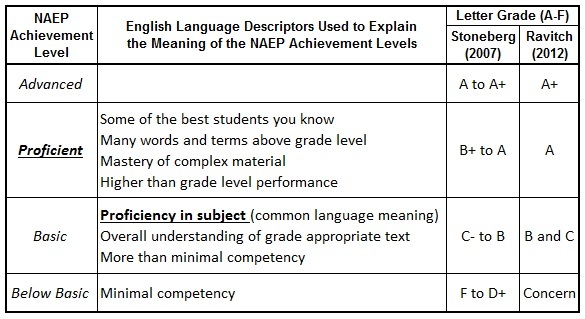The Don’t Fail Idaho media blitz asks us to rethink education for Idaho because results from the NAEP 2011 tests prove that about 60 percent of Idaho’s fourth- and eighth-grade students were not proficient in reading and mathematics. Not proficient in the sense that 60 percent of our students are not making the grade, are falling further behind and will never catch up.
Not to panic, though! The Don’t Fail Idaho campaign’s message about student achievement is based on an incorrect understanding and analysis of NAEP achievement levels. One thing for sure, misreporting student achievement data is not going to help anyone make informed decisions about K-12 education in Idaho.
The English language descriptors in the table were gleaned from a variety of NAEP publications and presentations. They were used to help define and clarify how NAEP achievement levels should be understood, interpreted, and used.
It is important — even crucial — to understand:
1. That NAEP uses Proficient to name one achievement level.
2. that NAEP uses proficiency in subject to define the achievement level named Basic. NAEP Proficient does not mean proficiency in the subject. Period.
If the National Assessment Governing Board had elected to use letter grades from “A” to “F” instead of achievement level names, the Board could might have used “A+” for Advanced, “A” for Proficient, and “B” and “C” for Basic.
Unfortunately, Don’t Fail Idaho focused on the name Proficient rather than on “proficiency in the subject.” As a result, the campaign reported that more than 60 percent of Idaho students failed to exhibit at least an “A” performance in reading and mathematics. Not a useful statistic. It told us absolutely nothing about the “B” and “C” students who did demonstrate NAEP proficiency in reading and mathematics.
On NAEP 2011, 31 percent of our fourth-graders and 19 percent of our eighth-graders were not proficient in reading, while 17 percent of our fourth-graders and 23 percent of our eighth-graders were not proficient in mathematics. None of these percentages square with the 60 percent claimed in the media blitz.
For more about using letter grades to help understand NAEP’s achievement levels see:
- Ravitch, D. (2012). Copy of Ravitch May 14, 2012, blog post
- Stoneberg, B. (2007, p. 4).


